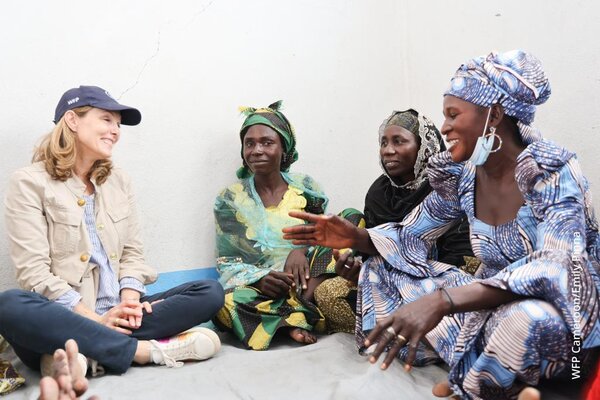Princess Sarah Zeid of Jordan calls for enhanced and collective action to make Cameroon a more equitable place for all girls and boys, women and men
During her visit, Princess Sarah engaged with the Prime Minister, the First Lady of Cameroon, Government Ministers, UN agencies, Non-Government Organisations, rural women and girls’ associations, women leaders, and actors from the private sector. Princess Sarah also interacted with school children and visited a refugee camp in the Far North region of Maroua to get first-hand insights of women and girls’ priorities and challenges.
“Rural women and girls are at the heart of their families’ health and wellbeing. They play a vital, though often undermined role in agriculture and food production,” said Princess Sarah. “We need to provide them with full access to resources and opportunities so they can be effective contributors to food security and nutrition and efficient business and economic actors”.
With the First Lady of Cameroon, Princess Sarah discussed opportunities to support human capital development and prosperity by helping women to take their rightful place as economic actors in their households and communities.
Gender inequalities continue to limit women’s ability to participate in socio-economic activities and exacerbate food insecurity and malnutrition with 2.4 million women, men and children in need of emergency food assistance in Cameroon.
“Gender inequality constrains growth, property and peace of nations. Our job today is to work together to unlock the barriers that limit rural women’s access to and control over resources and opportunities. Together, we can make rural women partners in our work to break the cycle of food insecurity and malnutrition” Princess Sarah added.
From the various discussions with the Government and partners, WFP has reaffirmed its commitment to support efforts towards ensuring that boys and girls, women and men have equal access to resources, services, decision-making, education and economic opportunities for increased food security and nutrition for themselves as individuals, but also for their families and communities.
In Cameroon, despite the tremendous and commendable efforts by the Government and partners to address gender inequality in various domains, 51.5% of women live below the poverty line, and less than 15% of landholders in Cameroon are women - who in turn make up 72% of workers in the informal agricultural sector. Women's access to credit is also limited; just 17% of women have access to credit. Although women play a predominant role in agricultural production, men have privileged access to more opportunities and often take decisions that affect the entire community with little engagement with women and youth.
WFP has been supporting the Government in saving and changing lives through food and nutrition programmes including distribution of specialised nutritious foods for children aged 6-59 months and pregnant and nursing mothers. WFP also supports social behaviour change communication for communities in the most vulnerable areas, particularly the Far North region, Northwest and Southwest regions.
WFP’s school feeding programme helps girls, especially adolescent girls, to stay at school, reducing the risk of child and forced marriage. It also contributes to breaking the barriers that girls face in accessing education. The UN food agency also supports vulnerable communities with resilience-building programmes which have a direct impact on the accessibility to a safe, diverse, and nutritious diet.
# # #
The United Nations World Food Programme is the world’s largest humanitarian organization, saving lives in emergencies and using food assistance to build a pathway to peace, stability and prosperity for people recovering from conflict, disasters and the impact of climate change.
Princess Sarah is WFP’s Special Adviser on Maternal and Child Health and Nutrition, and Convener of the Roadmap to Accelerate Progress for Every Newborn in Humanitarian Settings 2020-2025. She supports efforts to reduce maternal, child and newborn mortality and morbidity in populations affected by violence and conflict, and champions the health, wellbeing, empowerment and contribution of girls and women in fragile and humanitarian settings.
Follow us on Twitter @wfp_media @WFP_Cameroon

